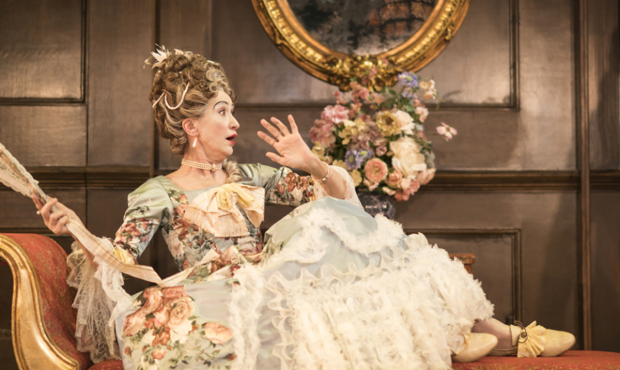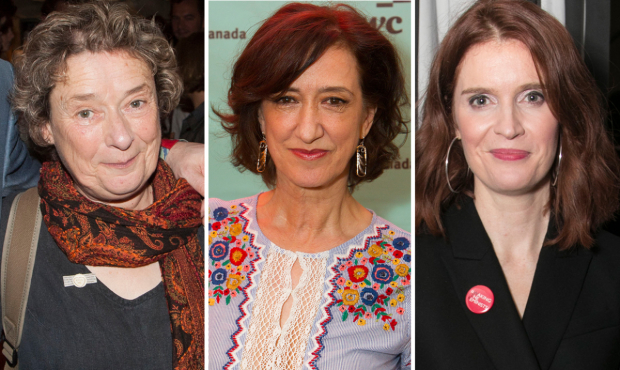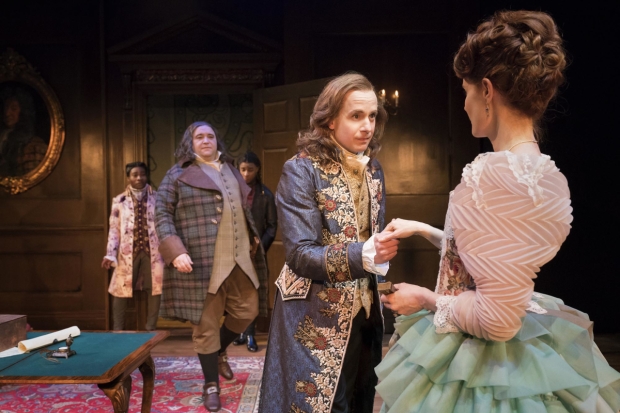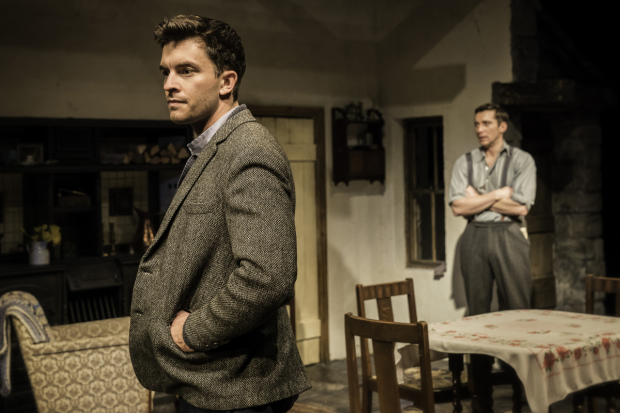Review: The Way of the World (Donmar Warehouse)

© Johan Persson
The Way of the World was William Congreve’s final play, written in 1700 before he retired from his short, blazing career as a dramatist. It has long been regarded as a classic of British theatre – but it is a problematic one.
Restoration comedies which thrive on cynical manipulation, satiric views of the state of affairs between men and women and stock caricatures are increasingly at odds with modern tastes. They can feel like pieces played on a harpsichord; elegant but slightly tinny to modern ears.
Yet director James Macdonald and his entire creative team frame this rare revival with such thoughtful care that it emerges with the gleaming richness of a symphony. The key to his sensitive and sophisticated approach is that it treats the characters seriously; they speak the lines rather than declaim them, finding the meaning and the feeling behind elaborately shaped speeches and contrived jokes. And they are placed in a world that is both recognisable and historical.
This is obvious from the very first when, in Anna Fleischle’s stunning designs, a gauze curtain bearing the translucent shape of a house rises to reveal a panelled room, where two men play cards, wearing wigs and high heels, with their richly embroidered coats slung over their chairs. Each period detail is observed, including a bright bronze chocolate pot, but their inflection is naturalistic. Words such as prithee are part of their speech rather than an arch embellishment to it.
They are Fainall (Tom Mison) and Mirabell (Geoffrey Streatfeild) and their conversation sets in action the play’s elaborate plot which is broadly baffling but basically involves two separate but interlinked schemes: one to trick Lady Wishfort (Haydn Gwynne) out of her own fortune and the other to shame her into allowing Mirabell’s marriage to her niece Millament (Justine Mitchell).
The sureness of touch revealed continues throughout. Just as the costumes are a lush pleasure of rustling silks, flowers, feathers and flounces, centuries old but with a modern, modish twist, so the performances are pitched to be funny to a modern audience but without sacrificing Congreve’s essential tone. It is a clever balancing act and beautifully accomplished.
Macdonald highlights the play’s themes: the perilous need to hold on to fortune and status, particularly for women; the way agreed contracts bind society together; the need for morality and kindness to underpin the law. But he also, with the help of his superb cast, makes every character come to life.
Crucially the characters are not seen from the outside but felt from within. Gwynne’s Lady Wishfort is a comic joy, tottering around the stage like a cut-price Marie Antoinette in an inappropriately youthful gown. She pulls every ounce of humour out of the famous scene where she prepares to make her good impression on her (fake) suitor. "Nothing is so alluring as a levee from a couch in some confusion," she declares, rising clumsily and waving a hopeful ankle. But she also reveals the distress Lady Wishfort feels, written off at 50, forced to paint her face. "I look like an old peeled wall," she cries, heartbreak in her eyes.
Even the manipulative Mrs Marwood (played by Jenny Jules with a hauteur that hides real pain) is allowed our sympathy; she has been used by Fainall, who Mison plays magnificently, his languor hardening into savagery as the evening progresses. As his traduced wife, Caroline Martin finds a moving sense of betrayal and fierce self-reliance.
Each 'wit' is carefully delineated, from Fisayo Akinade’s preposterous Witwoud, falling from a great height onto every word, to Simon Manyonda’s pugnacious Petulant. Christian Patterson brings warmth and sincerity to the bumbling country cousin Sir Wilfull. He is a fish out of water, not a blockhead. As the play acting plotters Sarah Hadland and Alex Beckett are a comic but realistic joy; you feel his pleasure when he, a servant, is suddenly forced to impersonate a lord but also her terror when the scheme is discovered.
At the heart of the play stand Millamant and Mirabell, truly in love, but negotiating their marriage like skilled lawyers. Mitchell is delightful as Millamant, her face a constantly moving picture of amazement, disbelief, hope and fear. When she says she does not want to "dwindle into a wife", it is a real concern; this is a woman fighting hard to carve a place in the world, reluctant to play by its established rules. As Mirabell, Streatfeild is equally wonderful: gentle and slightly withdrawn, love in his eyes, even when his words are sharp.
The only problem with this approach, which brings compassion and understanding to a play that is essentially sharp-eyed, is that it makes its plot and particularly its treatment of women even harder to bear. Why should Lady Wishfort be so harshly treated? Why is Lady Fainall left alone? Why is marriage something so to be feared? The production ends with a dance of joy and reconciliation, but the questions drift in the air.
The Way of the World runs at Donmar Warehouse until 26 May.















